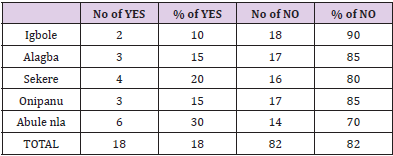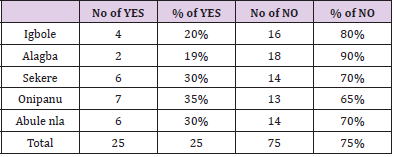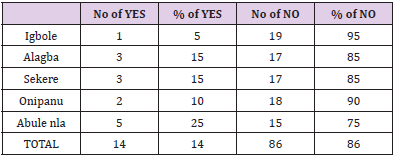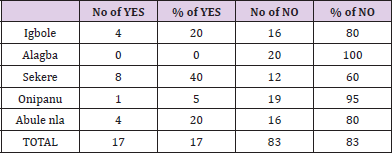Abstract
Recent approaches to agricultural development, including food production and food security, have largely failed to reduce the absolute numbers of the food insecure or to ensure environmental sustainability. Whilst global achievements in food production have been impressive in the last 50 years, the global inequalities in food entitlements (ie., people’s ability to acquire food and gain access to and control of productive resources) remain one of the biggest obstacles to achieving food security for all. Agricultural production is an essential component to the sustainability to the economy of developing nations as a whole and Nigeria in particular. Ease access in the rural areas poses a bundless challenge to actualize rural advancement efforts in Nigeria through agricultural reforms, as it has continued to make most of the rural areas to find difficulties in accessing markets for their produce and vice versa. The problem associated with food security is not only based on the availability of lands and production. However, it also relates to other aspects, such as transportation, accessibility, stability, and utilization. This paper focuses on the impact of transportation on agricultural practices and production in rural area. The method of investigation used was questionnaire designed for the farmers. Emphasis was laid on the causes and effects of poor roads network caused by lack of provision for maintenance of roads, flooding during raining season which lead to the high cost of transportation from the farm to the markets and therefore reduce the farmers income and quality of goods available in the markets. From the data collected some effects were identified, militating against the effective and productive practice of agriculture in the study area. However, some recommendations were made to assist in solving the problems.
Keywords: Agriculture; Food security; Transportation; Rural Area
Introduction
Solving the problems and overcoming the obstacles to sustainable food security, although daunting, are not options, because food security is critical not only to national security but also to global stability (Sheeran, 2015). Feeding the world’s rapidly expanding population can therefore rightly be viewed as the main global challenge of the 21st century. As the world population continues to grow, there is needed to urgently intensify more work and innovation in order to sustainably promote agricultural production, enhanced the global supply chain, ensure that all who are suffering from severe hunger and malnutrition have access to quality and nutritious food as well as decrease food losses and waste. It is projected that to be able feed its expected world populations of 9.3 billion by way of the middle of this century, the arena will need to elevate worldwide meals manufacturing by round 70% [1]. The bedrock of agriculture and agricultural development in growing nations of sub-Saharan Africa is rural development, without which all efforts at agricultural development could be futile [2]. Formidable food structures that can curtail hunger and poverty especially among the various rural farmers will require sustainable inclusion in crop production [3].
A food-comfy global calls for that the ones currently living in rural poverty emerge as capable of produce agricultural surpluses, allowing them to promote the excess for earnings, to invest in higher agricultural practices and to insure towards the awful seasons a good way to unavoidably come, every now and then, and lift themselves from poverty [4]. The plants, farm animals, and seafood produced in Nigeria contribute forty% of the gross home product and employs about 70% of the working population [5]. Both agriculture and delivery sectors face weather resilience demanding situations.
In Nigeria, which is typically an agrarian state with greater than 70 percent of the populace residing inside the rural areas, the inhabitants are broadly speaking farmers engaged in agriculture producing goods together with palm oil, yam, garri, Kola nut, rice, beans, cocoa and so on; that are ate up in the cities and most of the agricultural raw substances utilized by the industries, most people of the goods to be transported are by nature regularly bulky, low rate, perishable.
Transportation is well-known shows a completely close relation to the style of life, the range and region of activities, items and services so as to be to be had for intake and it is therefore a major factor in all economic activities [6]. Agricultural production is the principal career of the population and people of the country and at the same time; it affords employment directly or indirectly for as a minimum 60% of the total population of Ogun state. Most of the agricultural dwellers are traditional peasants, whose person contribution is insignificant but together form a vital bed - rock for economic system of the environ which represent 90% of meals and fibre produced in Nigeria.
Extreme hunger and poverty are predominantly rural, with smallholder farmers and their families making up a totally large share of the negative and hungry [7]. Thus, eradicating poverty and hunger are integrally linked to boosting food production, agricultural productivity and rural incomes [2,8]. As an economic factor of production of goods and services; transportation provides market accessibility by linking producers and consumers. An efficient transport system offering price, time and reliability benefit lets in items to be transported very fast [9].
The role of transport is very crucial because it is a stage in production technique which get completed only when the commodity is within the reach of the final consumers [10]. Availability of transporting facilities is an essential investment element that stimulates monetary increase via increased accessibility, its performance and effectiveness [11]. Land, healthy soils, water and plant genetic assets are key inputs into meals production, and their growing scarcity in many parts of the world makes it vital to utilize and manage them sustainably. Advances in transportation, has made viable modifications in the manner of living and the way wherein societies are prepared and therefore have an exquisite affect inside the improvement of the economic quarter.
In rural placing, transportation is an essential within the switch of goods from the farm to the markets and such company is right for nearby productiveness enhancing the livelihood opportunities of the local farmers. As such transport is one of the various elemental elements in rural improvement and it’s miles important to understand its function in rural development and specifically the way it interacts along other factors of development, to provide the ensuing structure of the rural financial system and society. The availability of transports centers in rural groups therefore influences the fundamental capabilities of manufacturing, advertising and intake.
Transportation influences the value of commodity fed on and the purchasing power of the purchasers. Some 450 million smallholder farmers round the sector face negative advertising linkages. Additionally, the farming practices are characterized by low productiveness due to dependence on own family labour, lack of funding and capital, assets and inputs which includes seeds, fertilizers, irrigation gadget and machinery. Smallholders stay dispersed and non-aggregated [12,13].
Better rural transport infrastructure and services may be required to enable rural access and encourage urban linkages, improvement the entry to markets, decrease transporting charges, reduce crop wastage, increase food safety and boom manufacturing on a diminishing worldwide land resource, depleted through nutrient flows to the urban centres. Improved rural transportation will allow investments and rural based cost chains (agro-industries) with associated rural employment and economic development main to greater self-reliant rural groups. It is consequently towards this background that an strive is made on this paper to observe how transportation of agricultural practices and produce affects rural areas with emphasis on its implication on sustainable food security.
Materials and Methods
The study was carried out in Ibarapa Central local government area of Oyo state. Ibarapa central local government area is located on latitude 70.270 North and longitude 3.02o east. It is about 24km east of Abeokuta and 60km west of Ibadan. Ibarapa central soil is significantly made of humus soil, which is mainly influence by topography and parent materials. The parent materials are of schist and quartziter, hence, the main soil consist of brown, sandy, loamy, overlying red, clay, the weather schist account for the soil. Ibarapa central is found in the forest vegetation despite age long human interference with the original forest vegetation, the area is able to retain the forest vegetation species. Based on latitudinal location of Ibarapa Central, it’s found within the tropical hinterland climatic belt. Here, there is a double maximum of rainfall especially in the southern part bordering Ibadan region and Ogun state. The annual rainfall is between 150mm and 200mm.
Relative humidity is over 80% in the morning and varies to between 50% and 70% in the afternoon. The mean annual temperature is 27°c and annual temperature range is 8oc [14]. Simple random sampling was used to select the five (5) farm centres in the local government, well structural questionnaire as well as direct personal contacts was used to gather data from the selected farm centres. One hundred (100) questionnaires were distributed evenly and randomly to the 5 selected centres in the local government. Data gathered from the questionnaires were subjected to analysis using percentage and frequency counts.
Results and Discussion
Testing of Research Hypotheses
Road transportation and availability of agricultural products. H1 stated that there is no road transport and cost of Agricultural products available.
Table 1 shows interpretation response of people to the Hypothesis one. The ‘yes’ responses indicate that there is no significant difference between the quality of road and cost of Agricultural product available which ‘NO’ response indicate otherwise. Majority of the respondents 82% oppose to the opinion that the cost of Agricultural products available is high as a result of the poor quality of road in the area of study. In the first hypothesis, 82 respondents agreed that there is a significant difference in the quality of road and Agricultural products, poor road i.e. the cost of Agricultural products available to high market centre. Therefore, the hypothesis is rejected.
H2 stated that there is no significant difference between the quality of road transport and aspiration of farmers to produce bulk agriculture products (Table 2). In the second hypothesis we observed that about 75% of the total respondents supported that fact that poor road does not make farmer to produce in large quantity, while 25% disagree with the statements. The above interpretation indicated that the poor quality of road affected farmers negatively even not to be producing in large quantity. The percentage of ‘No’ response is 75% this indicated that the hypothesis is defected. Inadequate transport provision leads to the overall waste of 25% of the total agricultural nutrients produced [15]. Idachaba [16] in his study of agricultural production problems in the rural areas contended that transportation among other factors represents the most critical constraint to agricultural product and development in Nigeria.
H3: stated that there is no significant difference between the quality of road and cost of goods transported to the market (Table 3). The third hypothesis shows that out of the respondents, 86% supported the fact that there is significant difference between the road quality and cost of good transported to the market, while 14% disagreed that there is no significant different between them. It is obvious that cost of goods transported to the market is high because of poor quality of road i.e., encourage high transport changes on the farmers. Aremu stipulated that vehicle operating cost are strong i.e., dependent on the quality of road, the poor quality of road transport constitute a lot to the high cost of transportation of agricultural products in Ibarapa central local Government Area. Since total number of supporters is greater than those who disagreed the hypothesis state by the researcher. Ajiboye [17] determined that insufficient supply and high cost of food stuff is due to inefficient transportation and distribution.
H4. There is no significant difference between the quality of road transport and per – capital income of Farmers (Table 4). The above table was drawn to interpreter the response of people to the hypothesis four, 83% of the respondents observed that there is a significant difference i.e., the quality of road transport reduced the per capital income of the farmers while 17% disagreed that there is no significant difference. Therefore, the percentage of agreed is greater than the disagreed. The above interpretation shows that, the poor quality of road reduced the per – capital income of farmers [18-21].
Silyonow stated that the consequently of poor roads and inadequate transportation widespread beyond just the impact on agricultural practices poor roads reduced income to workers in the Agricultural sectors.
Conclusion
This paper examines the impact of transportation on agricultural practices and production in rural area. It was observed that some road which serve the villages are liable to the flooding during the raining season. Thereby the economics activities especially inter collectivity of items are disrupted during the rainy period. High cost of transportation depends on the quality of road and convenient accessibility poor road and constitutes a lot to the high cost in Transportation front farm to the market center through the conducted research. This also is limiting access to the school hospitals and cultural facilities limited economic opportunities and poor living condition lead the more active and mobile members of the rural population to move to urban centres here. It is observed that the levels of farmers aspiration to produce agricultural product and production in bulk are rendered low. Through observation the poor road affected the quality of agricultural products that are available in the market centers.
Despite the fact that Nigeria is basically an agrarian country and the bulk of the products to be transported are typically agricultural merchandise. They have to be conveyed from their location of manufacturing to their sector of intake with minimal postpone and price, in addition to extensively dispersed over the to available land place (Upton, 1988). It therefore calls for a correspondingly widespread shipping net-paintings to take produce from farm to market. Agricultural practices serve as a source of food and raw materials for the nation and wipe all manner of hungry. So many countries of the world have succeeded in becoming developed country through the agricultural practices. However, the success of agricultural practices in the region of the study area depends on the welldesigned roads and bridges most suitable for the rural areas and regular maintenance of such roads by government. The Implication of this poor road on the production of food and cash crop in Ibarapa central is the reduction of in the production which has eventually leads to the low pace of economic development and how carrying which has reduced this economic growth of this area. Hence, there is a high price in the cast of some perishable goods.
References
- (2009) Food and Agriculture Organization of the United Nations. Global agriculture towards 2050, High Level Expert Forum - How to Feed the World in 2050.
- Abdulraheem MI (2020) Problems and Prospects of Subsistence Agriculture among Peasant Farmers in Rural Area. International Journal of World Policy and Development Studies 6 (6): 51-55.
- Fudzagbo J, Abdulraheem, MI (2020) Vermicompost Technology: Impact on the Environment and Food Security. Agriculture & Environment 1(1): 87-93.
- KENDAT, IFRTD, TCP International (2013) Rural Logistics for Smallholder Farmers to Meet New Agricultural Market Demands - A planning framework for improving the efficiency of transport services in the high value agricultural sub-sector, replicable in other values chains. Sutton: Crown Agents.
- Abdulazeez RA, Abdulraheem MI (2020) Reassessment of the Impact of Climatic Change on Agricultural Production and Economic Development. Agriculture & Environment 1 (3): 21-25.
- Ajiboye AO, Afolayan O (2009) The impact of transportation on agricultural production in a developing country: a case of kolanut production in Nigeria.
- Abdulraheem MI, Charles EF, Owoade OA, Onifade AO (2017) An investigation into the effects of rainfall variability on farming activities in rural area. Asian Journal of Advances in Agricultural Research 4(3): 1-7.
- Onifade AO, Abdulraheem MI (2019) Constraint of Women Participation in Agriculture in Rural Area. Ecronicon Agriculture 5(5): 248-255.
- Tunde AM, Adeniyi EE (2012) Impact of Road Transport on Agricultural Development: A Nigerian Example. Ethiopian Journal of Environmental Studies and Management 5(3).
- Adefolalu AA (1977) Significance of Transportation in Rural Development in Environmental and Spatial Factors. Proceeding of 20th Annual Conference of Geographical Association of University of Ife, Ile-Ife.
- Ajiboye AO (1994) Rural Accessibility and Transportation Problems. A case study of Ijebu North Local Government Area, Ogun State. Unpublished PGD in Transport Thesis, Department of Geography and Regional Planning, Ogun State University Ago-Iwoye.
- DGDA (2012) Dalberg Global Development Advisors 2012: Catalyzing Smallholder Agricultural Finance.
- Abdulraheem MI, Iderawumi MA (2019) Effect of Rural-Urban Migration on Education and Economics Development. American Journal of Trade and Policy 6(1): 7 -12.
- Oladapo OS, Ogundele AT, Akindele KI (2008) Define Ibarapa area in Ibarapa Region, Adeniran, L. A.(ed): Lanlate, Nigeria: Department of Geography. EACOED: Lanlate.
- Olajide SO, J K Olayemi (1972) A Quantitative Analysis of Food Requirement; Supply and Demand in Nigeria. 1968-1985. Federal Department of Agriculture, Lagos.
- Idachaba F (1980) The Green Revolution: A Food Production Plan for Nigeria. Final Report Submitted to the Federal Ministry of Agriculture.
- Ajiboye AO (1995) ‘Transportation and Distribution of Agricultural Products. A case study of Kolanut production in Remoland Ogun State’. Unpublished M.Sc Transport Studies Thesis Ogun State University, Ago-Iwoye.
- Aloba O (1998) Factors influence freight charge in rural Nigeria Ile-Ife inversing press ltd.
- Igben MS (1977) ‘Nigerian Railway Corporation: A Liability or An Asset’ in Onakomaiya and Ekanem (eds). Transportation in National Development. “NISER”, Ibadan.
- Upton M (1976) ‘Agricultural Production, Economics and Resource use’. Oxford University Press. Ibadan.
- Sheeran J (2015) Hunger as a national security and global stability issue [Internet]. Washington (DC): Women’s Foreign Policy Group 2008.

 Mini Review
Mini Review



